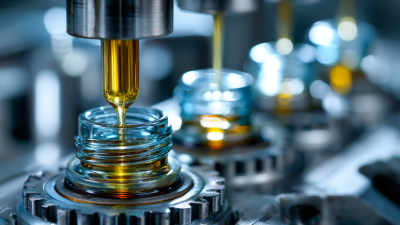Free Shipping on Orders Over $800 | Become a customer!
Menu title
This section doesn’t currently include any content. Add content to this section using the sidebar.
Your headline
Image caption appears here
Add your deal, information or promotional text
Lubricants play a crucial role in our everyday lives, yet their science often remains hidden behind closed doors. From the engines that power our vehicles to the intricate machinery in our homes, lubricants are essential for reducing friction, preventing wear, and ensuring smooth operation. This article delves into the fascinating world of lubricants, exploring how they work at a molecular level and their significant impact on everyday activities. By understanding the various types of lubricants available—be it for automotive, industrial, or household applications—we can appreciate their contribution not only to efficiency and longevity but also to safety and performance. Join us as we uncover the science behind lubricants and learn how these often-overlooked substances improve our daily lives in ways we might not even realize.

Lubricants play a crucial role in reducing
friction and
wear in various mechanical systems, enhancing efficiency and prolonging
the lifespan of equipment. The chemical composition of these lubricants can vary significantly, including bases such as
mineral oils, synthetic fluids, and bio-based materials. According to the
National Lubricating Grease Institute, around
85% of lubricating greases are formulated with mineral oils, while
synthetic lubricants are gaining popularity due to their superior performance in extreme temperature conditions and longer service intervals.
Among the common additives found in lubricants are
anti-wear agents,
detergents, and
viscosity index improvers. For example,
zinc dialkyldithiophosphate (ZDDP) is widely recognized for its anti-wear properties,
playing an essential role in engine oils. A report by the
International Energy Agency highlights that advanced lubricants can improve energy efficiency in machinery by up to
10%, demonstrating their significance in everyday applications ranging from
automotive to industrial settings. Understanding the chemical makeup of lubricants helps consumers make informed choices that could result in better performance and sustainability in their daily lives.
Lubricants play a crucial role in the automotive industry, significantly enhancing the performance and longevity of vehicles. Their primary function is to reduce friction between moving parts, which is essential for maintaining efficiency and preventing wear and tear. High-quality lubricants ensure that engine components operate smoothly, allowing for better fuel efficiency and reduced emissions. In modern vehicles, advanced synthetic oils and lubricants are formulated to withstand extreme temperatures and pressures, further improving their protective qualities.
In addition to basic lubrication, specialized products are tailored for specific automotive applications. For example, gear oils are designed to handle the unique challenges of transmission systems, while greases provide robust protection in wheel bearings and chassis components. The proper use of these lubricants not only enhances performance but also contributes to overall safety by ensuring reliable operation. As technology continues to advance, the role of lubricants will evolve, further cementing their importance in the automotive sector and ensuring that vehicles run optimally for longer periods.
| Aspect | Description | Benefits | Impact on Performance |
|---|---|---|---|
| Friction Reduction | Lubricants minimize friction between moving parts. | Reduces wear and tear, prolonging machinery lifespan. | Enhances efficiency of engines, increasing overall performance. |
| Heat Dissipation | Lubricants carry heat away from contact surfaces. | Prevents overheating and potential damage. | Maintains optimal operating temperature, enhancing performance. |
| Corrosion Protection | Certain lubricants provide a protective layer against moisture. | Extends the lifespan of metal components. | Improves reliability and longevity of automotive systems. |
| Seal Prevention | Lubricants help to maintain seals and reduce leaks. | Prevents fluid loss and keeps systems running smoothly. | Ensures reliability and consistent performance in operations. |
| Sound Dampening | Reduced noise from moving parts thanks to lubricants. | Improves comfort and driving experience. | Enhances user perception of quality and performance. |
Lubricants play a crucial role in enhancing the efficiency of household appliances, ensuring they operate smoothly and effectively. From washing machines to kitchen blenders, these essential fluids reduce friction between moving parts, thereby minimizing wear and tear. When components move freely, appliances consume less energy, leading to lower electricity bills and prolonged lifespan. In washing machines, for instance, lubricants help the motor function seamlessly, ensuring clothes are cleaned thoroughly without excessive strain on the machine.
Moreover, lubricants contribute to the overall performance of various appliances by helping maintain optimal temperature levels. For example, in refrigerators, lubricants used in compressors prevent overheating, allowing the appliance to maintain a consistent internal temperature while consuming less energy. This efficiency is particularly important in today's energy-conscious environment, where consumers seek eco-friendly and cost-effective solutions. By understanding and recognizing the significance of lubricants, homeowners can make informed choices about the maintenance and longevity of their appliances, ultimately leading to a more efficient home.
 The environmental impact of lubricants spans their entire lifecycle, from production processes to disposal methods. The production of lubricants often involves petroleum-derived ingredients, contributing to greenhouse gas emissions and pollution. For instance, it's estimated that plastics, integral to many lubricants, generated 1.8 billion tonnes of emissions in 2019 alone. As the world grapples with climate change, the contribution of lubricants to both energy use and waste creates a pressing concern that demands attention.
The environmental impact of lubricants spans their entire lifecycle, from production processes to disposal methods. The production of lubricants often involves petroleum-derived ingredients, contributing to greenhouse gas emissions and pollution. For instance, it's estimated that plastics, integral to many lubricants, generated 1.8 billion tonnes of emissions in 2019 alone. As the world grapples with climate change, the contribution of lubricants to both energy use and waste creates a pressing concern that demands attention.
Moreover, the disposal of lubricants poses significant ecological challenges. Improper disposal can lead to soil and water contamination, worsening the environmental footprint. As awareness of these impacts grows, regulatory bodies aim to balance industrial interests with environmental protections. Innovations in lubricant formulations and more sustainable disposal options, such as recycling or eco-friendly alternatives, can help mitigate these issues. However, there is a critical need for enhanced monitoring and adherence to sustainable practices throughout the lubricant lifecycle to ensure minimal impact on our planet.
Biodegradable lubricants are at the forefront of sustainable innovations, significantly impacting both industrial practices and everyday life. With concerns about traditional petroleum-based lubricants leading to environmental pollution, the shift towards bio-based alternatives is essential. Industry reports indicate that the biodegradable lubricant market is expected to grow substantially, driven by increasing regulatory demands and consumer preferences for eco-friendly products. For instance, the European Union’s updated bioeconomy strategy aims to bolster the use of bio-synthesized materials, highlighting the importance of sustainable solutions across various sectors.
One notable area of innovation is in the agriculture sector, where eco-friendly lubricants are enhancing sustainable farming practices. By reducing reliance on toxic materials, these lubricants not only protect crops but also contribute to healthier ecosystems. Companies are now employing advanced technologies to develop these lubricants from renewable resources, which aligns with growing trends in circular economy principles and sustainable manufacturing.
**Tips:** When choosing lubricants for personal or industrial use, look for certifications that verify their biodegradability. Additionally, consider the life cycle impacts of your lubricant choices to support a more sustainable future. Embracing these innovative solutions can lead to significant environmental benefits while maintaining performance standards.







We use cookies on our website to give you the best shopping experience. By using this site, you agree to its use of cookies.
